EBR charges a service fee to manufacturers to produce ebike reviews and videos, this began in 2018. It’s the same flat fee for each video, and it helps us to keep the site going while limiting ad clutter. We appreciate the opportunity to serve you with our opinions and data but respect your right to know that we receive compensation :)
The Samedi 27 Trail 8 is one of the higher specced full suspension mountain models available from Moustache. You can get it in three frame sizes for optimal fit, and I noticed right away that the top tube was made extra steep to lower stand over height. However, because of the “Hidden Power” semi-integrated downtube battery design, there was still room for bottle cage bosses below the top tube. Visually, I appreciate the way that the top tube aligns with the stays on the rear swing arm. I cannot confirm the exact design type but it appears to be a four-bar setup meant to isolate travel and reduce chain kickback. The drivetrain itself is thoughtfully engineered to reduce drops and chain suck in muddy conditions by using an alloy chainring guard and lower guide. This seems much less vulnerable and complex than a pulley or top mounted surround guide… compare with the proprietary Haibike Sprocket Equalizing System (SES) on the Haibike XDURO AllMtn 8.0 which costs over $1k more. The Samedi 27 Trail 8 is a sturdy ebike with fewer exposed parts that could get bumped and broken on rigorous rides. The 140 mm suspension is idea for trail use (a step above Cross Country but one step down from Enduro and Downhill) and the geometry is a bit more upright, with a shorter stem. Both shocks offer rebound adjust as well as lockout, but the fork is nicer, offering a compression clicker with lockout vs. just unlocked and locked like the Moustache branded rear shock. Up front, we’ve got a Fox 34 Float with thicker 34 mm stanchions that have been anodized black for style and hardness, which reduces stickiness when sliding. The hubs are wider, following Boost spacing, to accommodate the fatter plus sized tires, and they went with the medium 2.8″ vs. 2.6″ or 3.0″ which gives you excellent traction and float while reduced weight and making handling quicker. The Maxxis Rekon tires are siped for improved traction, beyond what you get with standard knobs, (siped means that they have been sliced length wise to provide more and grip), and they offer thicker dual density rubber with some puncture protection, as well as being tubeless ready. It seems like all of the components on this bike are a step above what I would have expected at this price point or uniquely selected for durability. The top suspension linkage is made from a Carbon alloy to be stiffer and reduce frame flex, the SunRace cassette uses high-tensile steel sprockets to reduce wear under pressure from the powerful Bosch CX motor, the motor is elevated and protected by a plastic skid plate, the rear suspension has a stanchion guard, the derailleur is positioned closer in towards the rear wheel and offers a one-way clutch to reduce chain bounce, and the Magura MT Trail hydraulic disc brakes offer a 203 mm front rotor with quad piston calipers for maximum stopping power and cooling (the rear disc is 180 mm and uses a lighter dual-piston caliper). Perhaps my favorite part about this ebike, is that it looks great and uses a widely available Bosch Powerpack. Most of the wires are internally routed to further conceal the electric assist, but the seat post dropper wire is partially external, reducing kinks and making it easier to adjust (in terms of seat height). Moustach was founded in 2011 and works exclusively with Bosch ebike drive systems. Their products aren’t widely available in the States yet, but they are slowly growing their network of trusted dealers where you can take test rides and place orders.
Driving this bike is a powerful mid-motor from Bosch called the Performance Line CX. It offers 350 to 570 watts of power output and up to 75 Newton meters of torque depending on the level of assist being used and how hard you pedal. If you live in Europe, this system may be rated at 250 to 500 watts and limited to 25 km/h vs. 20 mph (32 km/h), but it still delivers high torque. The motor controller listens to rear wheel speed using a magnet and electronic sensor on the left chain stay, pedal cadence, and pedal torque, over 1,000 times per second. These signals allow it to start and stop near-instantly to keep you in control… which is especially important in a mountain bike setting. Beyond assistance, this motor controller is also listening for tension changes in the chain, resulting from gear shifting. When it senses these inputs, it tells the motor to ease off in order to reduce mashing and gear grinding. It’s not a perfect system, and you can help it by easing back yourself as you shift gears, but it’s something that only Bosch is really doing right now. There have been a few hardware driven shift detection designs over the years (from Impulse and Bafang partners) but the software solution that Bosch has developed is a real differentiator. I love how Moustache has angled the motor and tucked it up into the frame to maximize ground clearance and shorten the effective chain stay length for a snapper ride feel. Visually, the motor blends into the frame tubing with its dark metallic grey paint and I like the red plastic skid plate below, which follows the red accents on the downtube. This motor spins a single chainring that is setup with 14 teeth, the smallest that Bosch supports, to maximize starting and climbing power. It’s equivalent to a traditional 35 tooth sprocket and spins at 2.5 revolutions for each crank revolution. The motor has a reduction gear to make this happen, and it provides a mechanical advantage and increased chain grab, but does increase friction when pedaling unassisted or above the supported max speed. You still freewheel and coast without friction, and I have had no problem pedaling bikes like this up to 30+ miles per hour on paved streets, but it is a difference in design compared to most other mid motors. The Bosch CX is also the most power hungry and loudest of the Bosch lineup and it weighs a bit more at 8.8 lbs… though that weight is positioned very low and centered along with the battery for optimal balance and stability.
Powering the bike is Bosch’s proven Powerpack 500 which offers 36 volts and 13.4 amp hours of capacity. I call this pack proven, because the design has been widely available in the US since ~2013, in the form of the Powerpack 400. Both batteries will work with the same mounting interface because the plastic housing is identical. There’s a loop at the top which makes carrying and handling safer, a 5-LED battery indicator on the left, and a proprietary plug on the base that fits into the mount. This plug is replicated on the left side of the mount so you can charge the pack without removing it each time you finish a ride. And, the Bosch charger is one of my favorites because it is so compact, lightweight, and fast, putting out 4 Amps vs. just 2 Amps on most competing basic chargers. Bosch does offer a compact travel charger that delivers 2 Amps, but it’s only 0.5 lbs lighter and just a little bit slimmer. The best part about this battery to me, is how universally available it has become. You can choose from hundreds of different electric bicycles that all use this same pack (or the Powerpack 400) and then share batteries. Imagine taking an extra pack in your backpack for a longer ride. Imagine shipping your bike to another state or country and using a battery on location vs. going through hazmat shipping processes (since Lithium-ion batteries of this size are not allowed on airplanes). It’s a good setup all around, and the locking core keeps it securely connected to your bike. Fellow cyclists may not even notice that you have a battery thanks to the black plastic cover that hides the pack underneath. The way this battery has been sunk into the downtube and then covered makes it one of the most beautiful and lowest-positioned designs around. The cover is easy to remove, just slide it down towards the seat tube and then lift upwards. There’s a spring mechanism at the base… but no lock or security for the plastic cover portion itself. This is one of the few vulnerabilities of the Moustache battery cover design, it could be stolen more easily, but they do sell replacements. You could always take the cover with you, but then water, dust, and leaves could blow in. The battery, motor, display, and wires on this bike are all highly water and dust resistant, but it’s still nice to keep the compartment clean if possible.
Operating this bike is easy because the display panel is so simple, and positioned within reach of the left grip. Once the battery pack has been charged and mounted, just press the power button along the top edge of the Bosch Purion display panel. The LCD screen blinks to life quickly and shows your current speed, level of assist, and another 5-bar battery infographic. You can change units by holding the minus button and tapping power (going from MPH to KM/H) and begin to adjust assist levels by clicking the + and – keys individually. It’s really that simple, pressing plus lets you navigate from Off, to Eco, Tour, eMTB, and Turbo. The higher you go, the more energy the motor will expend and the faster you can go. I usually ride in Eco and Tour for Cross Country and on-road sections, but eMTB has quickly become a favorite as well. This mode provides 120% to 300% power based on pedal torque. It was designed by Bosch with the help of professional mountain bikers and is amazingly natural. Sometimes, I feel that torque sensors make you work too hard, this is a ~52 lb bike after all, and I don’t always want to be getting Turbo level performance, but I also don’t want to strain my knees. the eMTB setting offers a smooth ramp of power, and allows you to focus more on shifting gears, pedaling, maneuvering the frame, and steering. And, with a wide range of 11 gears offering 11 to 46 tooth sprockets, there is plenty of shifting to be done. The drivetrain is really unique on the Samedi 27 Trail 8 in that it offers an upgraded XTR derailleur vs. the standard XT. It still has the tucked in Shadow derailleur and the Plus one-way clutch system. It’s a little orange lever that you can click up to tighten the derailleur spring and reduce bouncing for rough sections of trail. The heavier SunRace steel cassette is going to be more durable and with such a wide spread of sprocket sizes, you should be just fine with a one-by drivetrain here vs. the added weight and complexity of a two or even three-by drivetrain. Most of the mid-drive electric bikes I have seen in recent years are going with one-by and it makes a lot of sense to me. Coming back to the display, you can get feedback about trip distance and odometer by holding the minus button, and then eventually you’ll get to a dynamic range menu. To me, this menu is much more useful than the battery graphic with 20% increments because it factors in your last mile of riding and the assist level in use to give you a realtime estimate. I showed this a bit in the video review above. Another useful feature on this display is the walk mode button along the lower edge. You can press this and then hold the + button to have the bike push itself forward slowly. It’s great for climbing steep sections that maybe you didn’t feel comfortable riding, or if you get hurt and have to walk out, or if you get a flat tire etc. And with Bosch, it is possible to add integrated lights to the bike and then control them with the Purion display by holding the + button for a couple of seconds. The display itself is faintly backlit for use at night, and there is a Micro-USB port on the right edge, but this is only for diagnostics. Compared to the larger Intuvia display, the Purion has harder buttons that pivot in towards the screen, it is not removable, and does not swivel to reduce glare… but it is compact and tough.
I love the approach that Moustache has taken with their motor and battery integration, it’s not just on the Samedi 27 Trail 8, but also with the Trail 6 and some of their other crossover models. I trust the Bosch motor system because many shops have told me that they don’t need to do as many repairs on it, and I have heard that Bosch offers great support (as a part of the two-year comprehensive warranty here). This ebike isn’t especially cheap, but it’s a higher-end offering with premium hardware… for what you get, I actually think it’s a great value. A few other things I noticed and appreciated during this review were the adjustable-reach brake levers, locking ribbed grips with matching red hardware. The sturdy thru-axles with quick release for easy transport and trail maintenance, the two-way high gear shifter and multi-shift low gear shifter (this is a Shimano SLX hardware part), and the extra rubberized slap guard and channel on the right chainstay. The rims are a bit wider, at 35 mm, to support the plus sized tires and the stock pedals are wide and grippy… not the cheap cage style pedals I see a lot on other bikes. Some e-mountain bikes don’t include pedals at all. It seems like Moustache is pushing the envelope and thinking differently, not always just about aesthetics or weight savings, but what will work best for their specific build. A high torque motor with sturdy reliable drivetrain in this case. Depending on the frame size you select, it sounds like the handlebar length and seat post dropper may change a bit, going from 60 mm to 100 mm or 125 mm on the post to accommodate taller riders. I’d like to thank Moustache and Propel bikes for partnering with me on this post, Chris Nolte met me with a couple of bikes so we could compare back to back and it’s always fun to have a shops perspective since he gets to hear from actual customers. As always, I welcome your comments below and invite you to connect directly with others in the Moustach Ebike Forums.
Pros:
- Excellent suspension fork, it has wider 34 mm stanchions that are anodized black to be harder and smoother, it also supports the wider Boost hub spacing and a 15 mm thru-axle for strength
- The plus sized Maxxis Rekon tires are 2.8″ wide and siped for improved traction, they will reduce deflection and help to spread out the weight of the bike while adding comfort, they come tubeless ready and have puncture protection lining built-in
- Many full suspension electric bikes forego bottle cage bosses because the battery packs are mounted on top of the downtube… but the Moustache hidden-power design is sunk in and this makes space on the bottom of the top tube for a mounting point, you could also use this for a folding lock or mini-pump
- The top tube is very steep, lowering the stand over height of the bike, I like how it aligns visually with the seat stays on the rear suspension swing arm
- This bike is being produced in three frame sizes to accommodate a wide range of riders, it’s going to be more comfortable and stable than if you slid the saddle forward or swapped the stem to make it fit
- With 140 mm suspension, this is a true trail bike (meant for rugged conditions beyond cross country) and the adjustability of the suspension (with lockout) pairs nicely with the 100 mm dropper seat post to make transitions from hardpack to bumpy sections seamless
- Premium hydraulic disc brakes provide leverage over the larger wheels and heavier tires while maximizing cooling, you get a 203 mm rotor in the front with quad piston calipers and a more standard 180 mm rotor in the rear with dual piston to save weight, the Magura MT Trail levers offer adjustable length
- Great pedals, so many times it seems like electric mountain bikes skip pedals or give you cheap cage platforms but these VP alloy pedals are wide and grippy, they work great with sneakers on day one
- The drivetrain is a step above what I’m used to seeing, even on nicer products, you get an 11-speed cassette with Shimano Deore XTR derailleur that has Shadow Plus (bringing the derailleur in towards the frame and allowing you to tighten the chain with a one-way clutch), the cassette uses high-tensile steel to reduce wear, and I like the alloy chainring guard, cutaway into the right chain stay, and the little guide below the chainring to reduce chain suck (which can happen with Bosch Performance Line motors in very muddy conditions)
- I like how the motor has been integrated, it’s tipped up and mounted higher on the frame to shorten the effective chainstay length and increase ground clearance, the battery is sunk into the downtube, and both of these heavier parts are kept relatively centered on the frame for improved handling
- Moustache has done a better than average job of sealing the charging port and key slot on their frames, the caps seat securely and are connected to leashes so you won’t lose them
- The Bosch CX motor delivers higher torque (up to 75 Nm) for climbing applications and offers a ride setting called eMTB mode which offers a full range of power based on pedal torque, this mode lets you focus on shifting gears, pedaling, and steering without thinking so much about how the motor is set
- The Bosch Performance Line motors offer support up to 120 pedal strokes per minute, this allows you to pedal faster to go faster without always having to shift gears, many other motors fade out sooner than 120 and this requires shifting down to a slower cadence to maintain speed
- Bosch motor controllers actually measure your pedal strokes and then isolate them and listen for changes in pressure that might be shifting signals, they tell the motor to ease back when they detect this in order to reduce chain, sprocket, and derailleur wear
- The saddle caught my attention because it has some anti-slip rubber material on the nose, this makes it easier to grip and maneuver with your legs as you encounter jumps and big drops
Cons:
- I have found the Bosch CX motor to be the most power hungry and loudest in the Bosch electric bike series, it certainly delivers power and feels responsive, but you can reduce the noise by slowing your pedal cadence and save power by using lower assist levels if you wish
- Bosch Performance Line motors currently require a smaller chainring (14 tooth in this case) which spins at 2.5x for each pedal rotation… and the reduction gearing that makes this possible does cause some friction and drag if the motor isn’t active (when pedaling with the power off or pedaling above the top assisted speed of 20 mph, in this case)
- The bike is expensive, you can definitely get cheaper full suspension electric bikes, even with the Bosch CX motor, such as the Moustache Samedi 27 Trail 6 for $4.9k or the IZIP E3 Peak DS for $4,200 (though it uses a 25% smaller battery)
- Very minor gripe, I didn’t see any provisions for adding a kickstand on the left chain stay… this is not something you get with many mountain bikes but I have seen it on some full suspension Haibikes and Bulls models for people who ride to work or around town during the week
- The rear suspension was Moustache branded and had a rebound clicker, but there wasn’t a climb, trail, descend adjustment for compression, just open and locked out, it’s a minor grip… just not as nice of a part as you see for the front suspension fork
- The Bosch Purion display panel is compact and probably less likely to be bumped and broken than the larger Bosch Intuivia, but it isn’t removable, doesn’t swivel easily to reduce glare, and doesn’t have a functional Micr-USB port for charging portable electronics on the go
- The + and – buttons on the Purion control pad aren’t the most consistent, if you press down towards the left edge, they won’t click, even the center of the button can be a little firm and not work, they are designed as a pivot with the moving portion towards the right edge, near the LCD screen, which requires a longer finger reach
- The plastic cover that protects the downtube battery section is not really lockable, someone could pull it off and take it… so you could take it off yourself when parking at racks, but then water and dust can get inside
Resources:
- Official Site: http://www.moustachebikes.com/uk/samedi-27-trail-8.html
- More Pictures: https://photos.app.goo.gl/q7uQhYatH2IgaGeC2

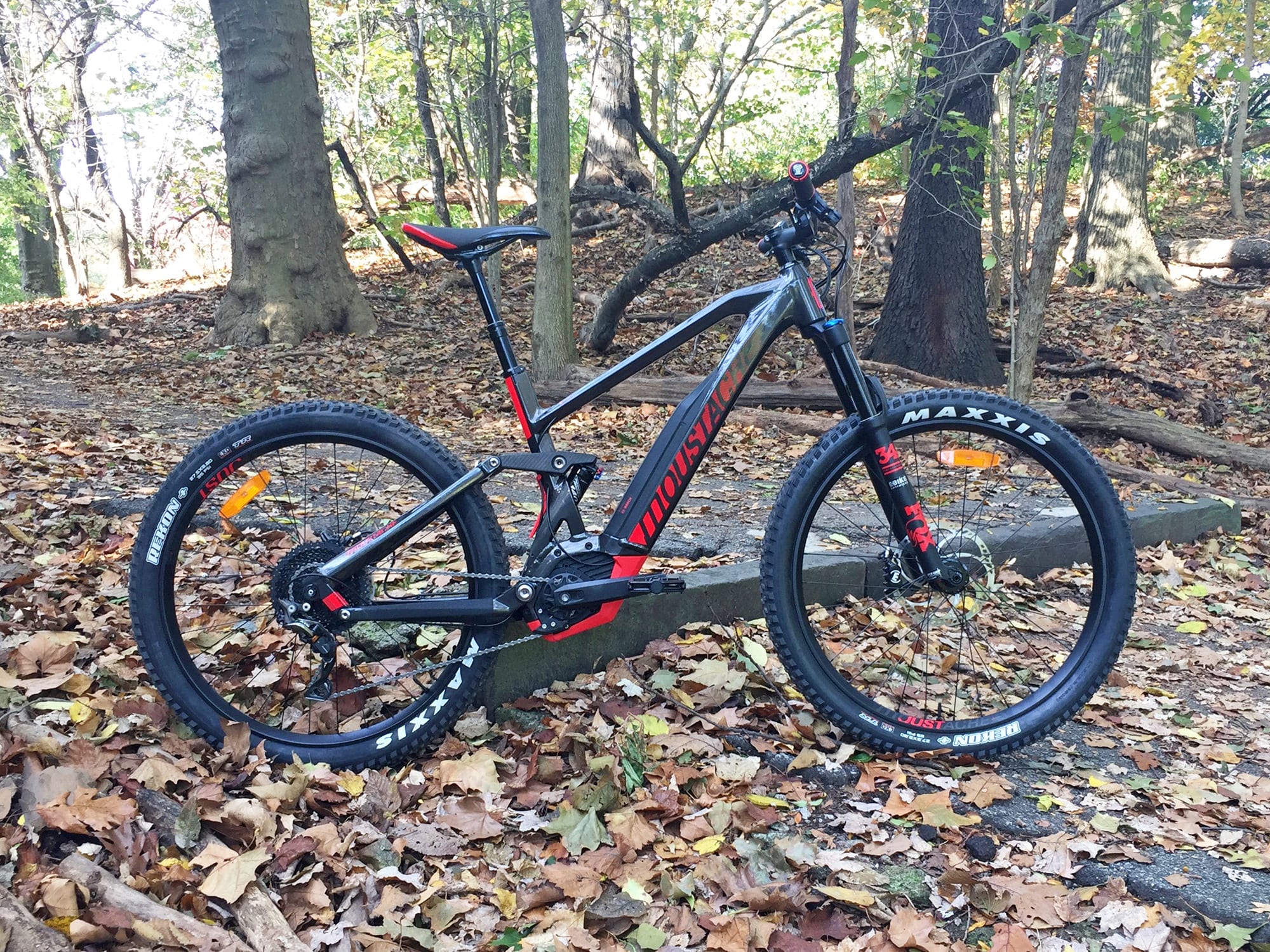
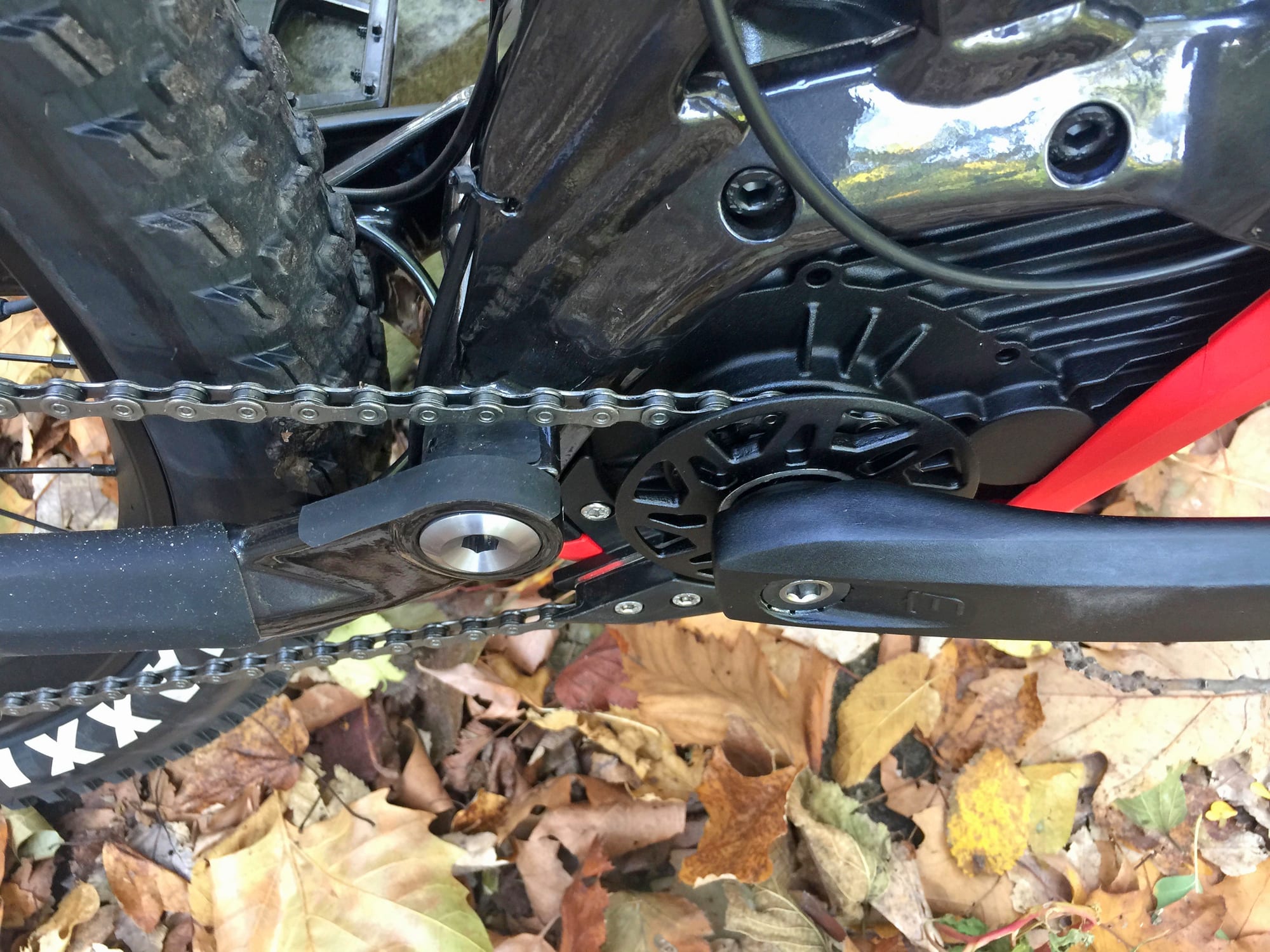
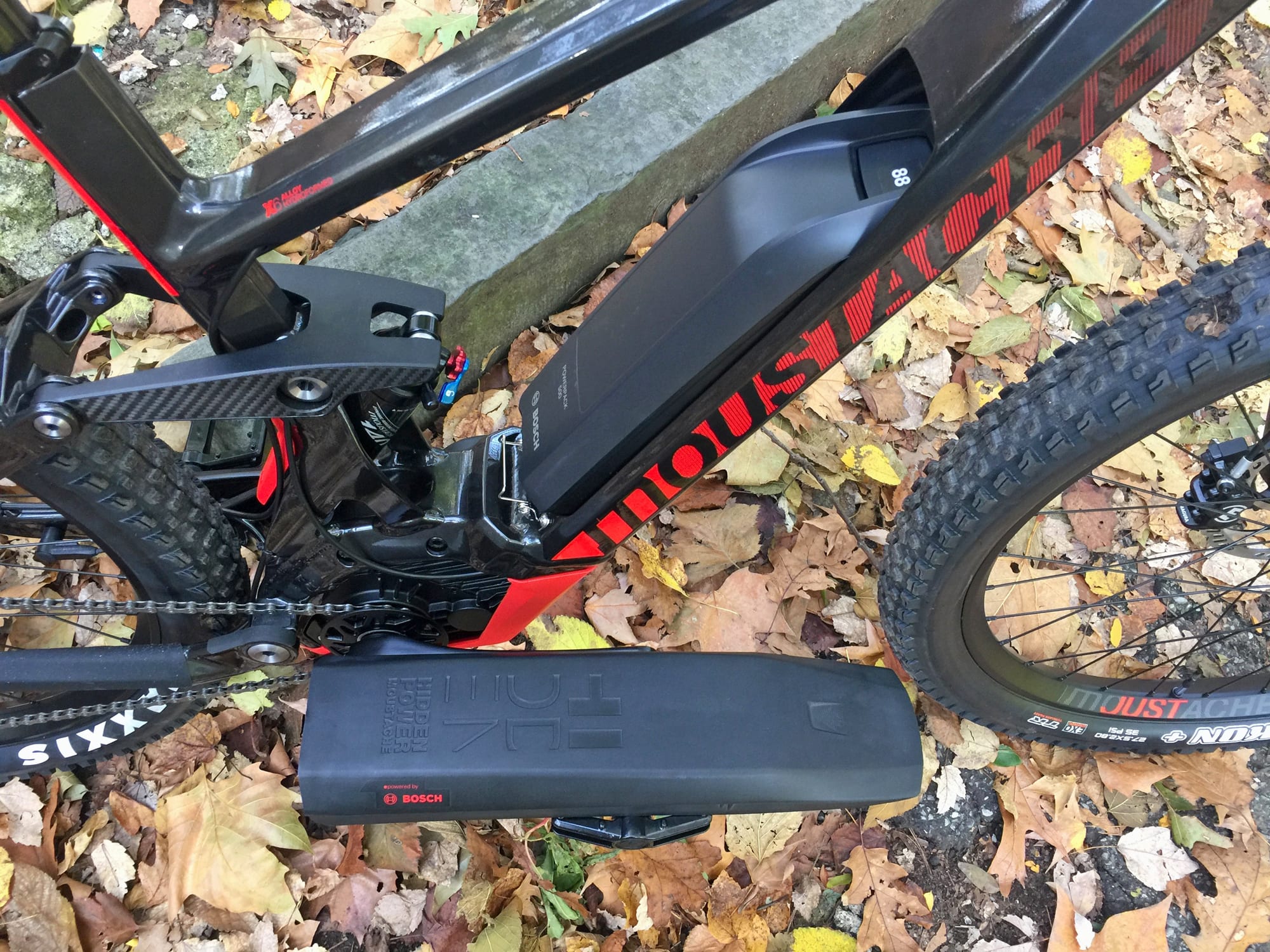
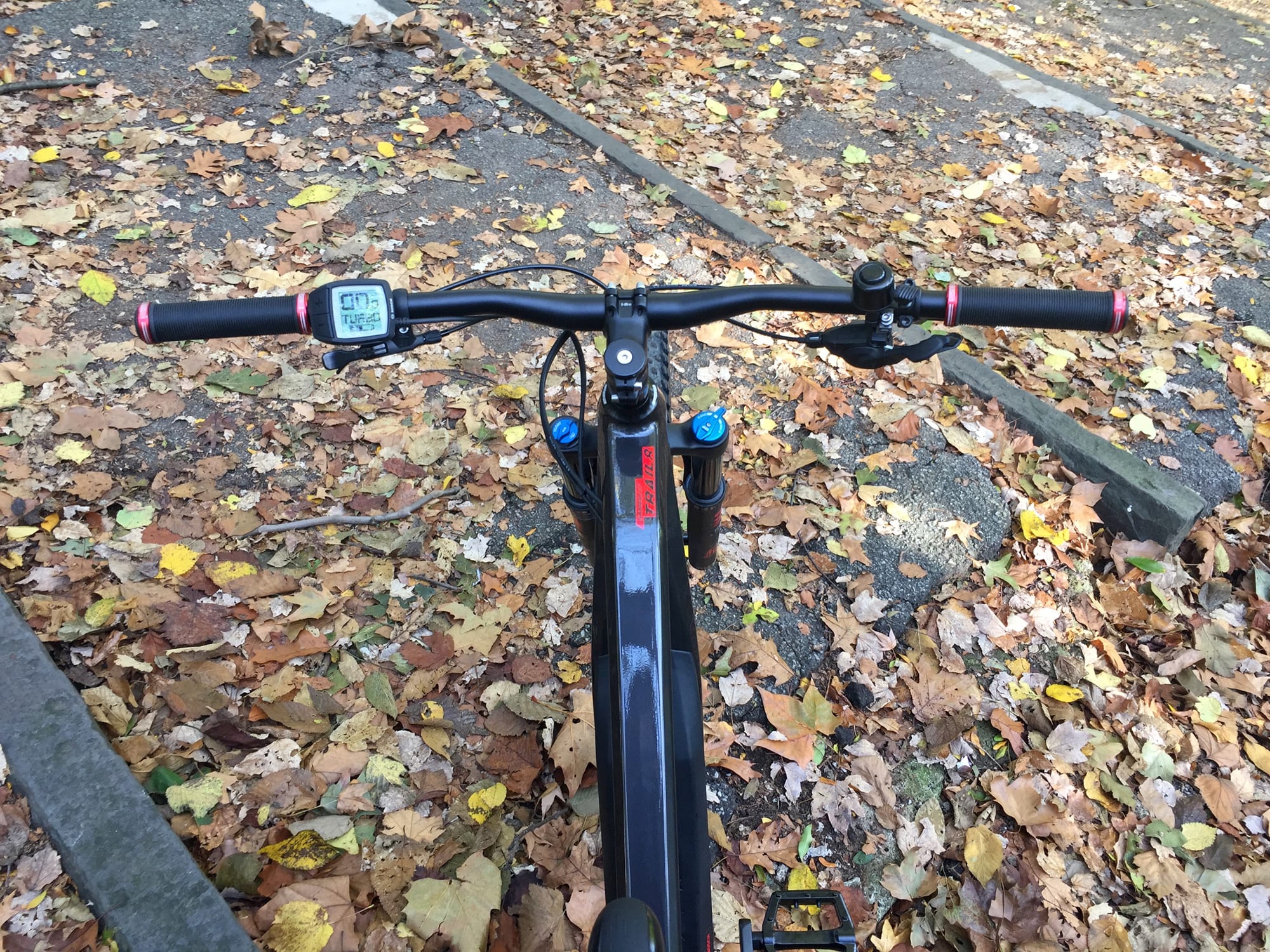
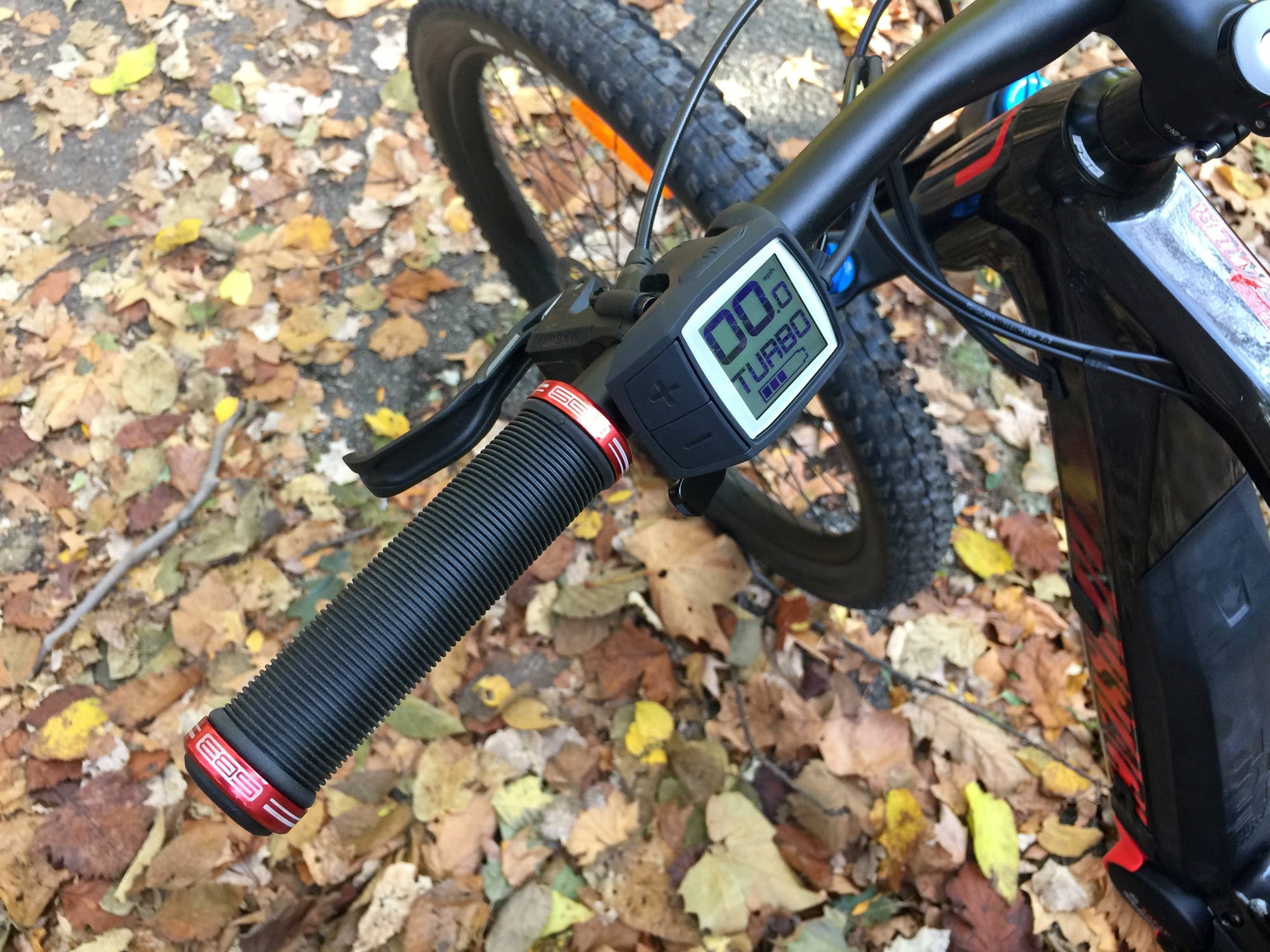
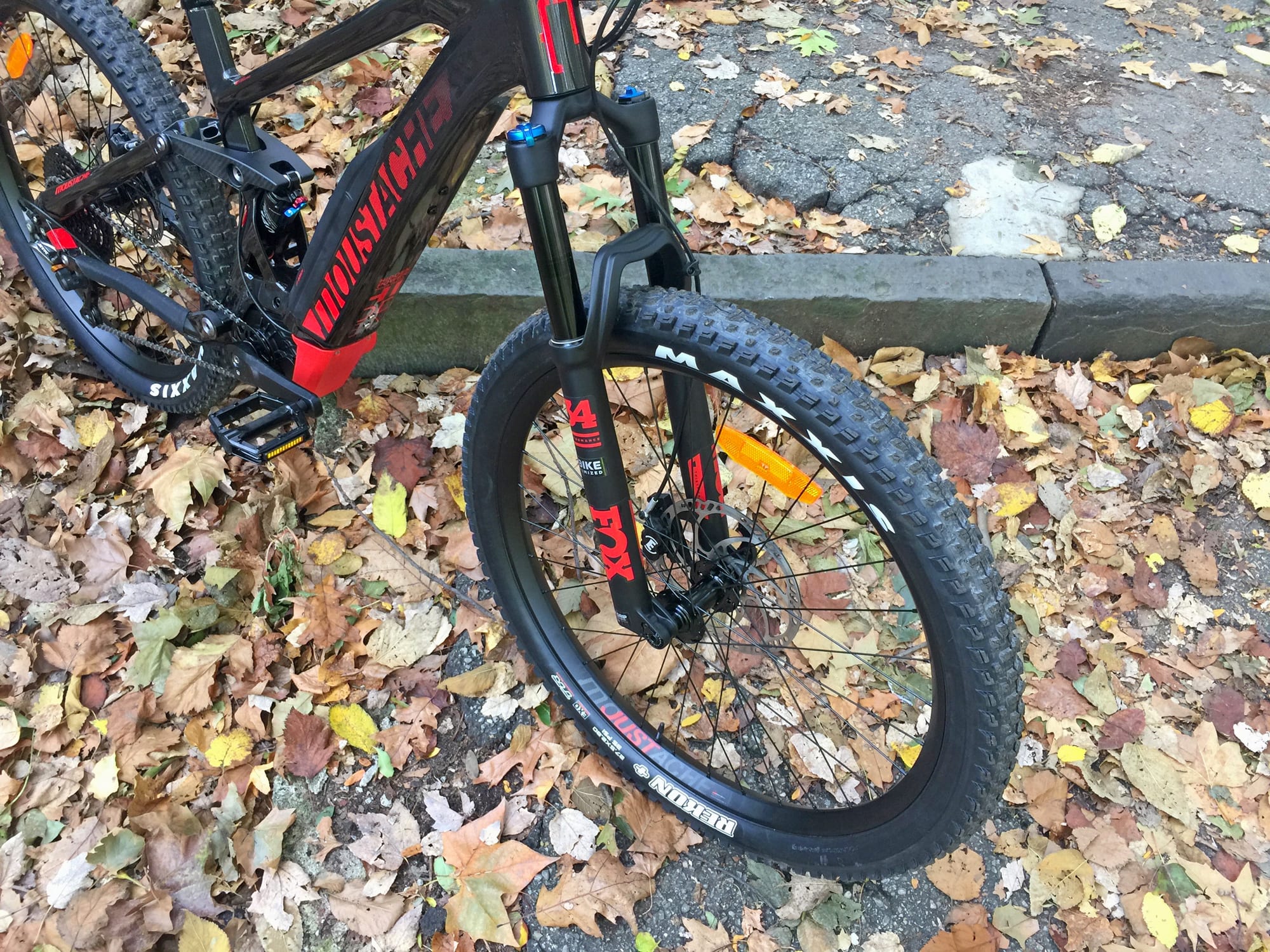
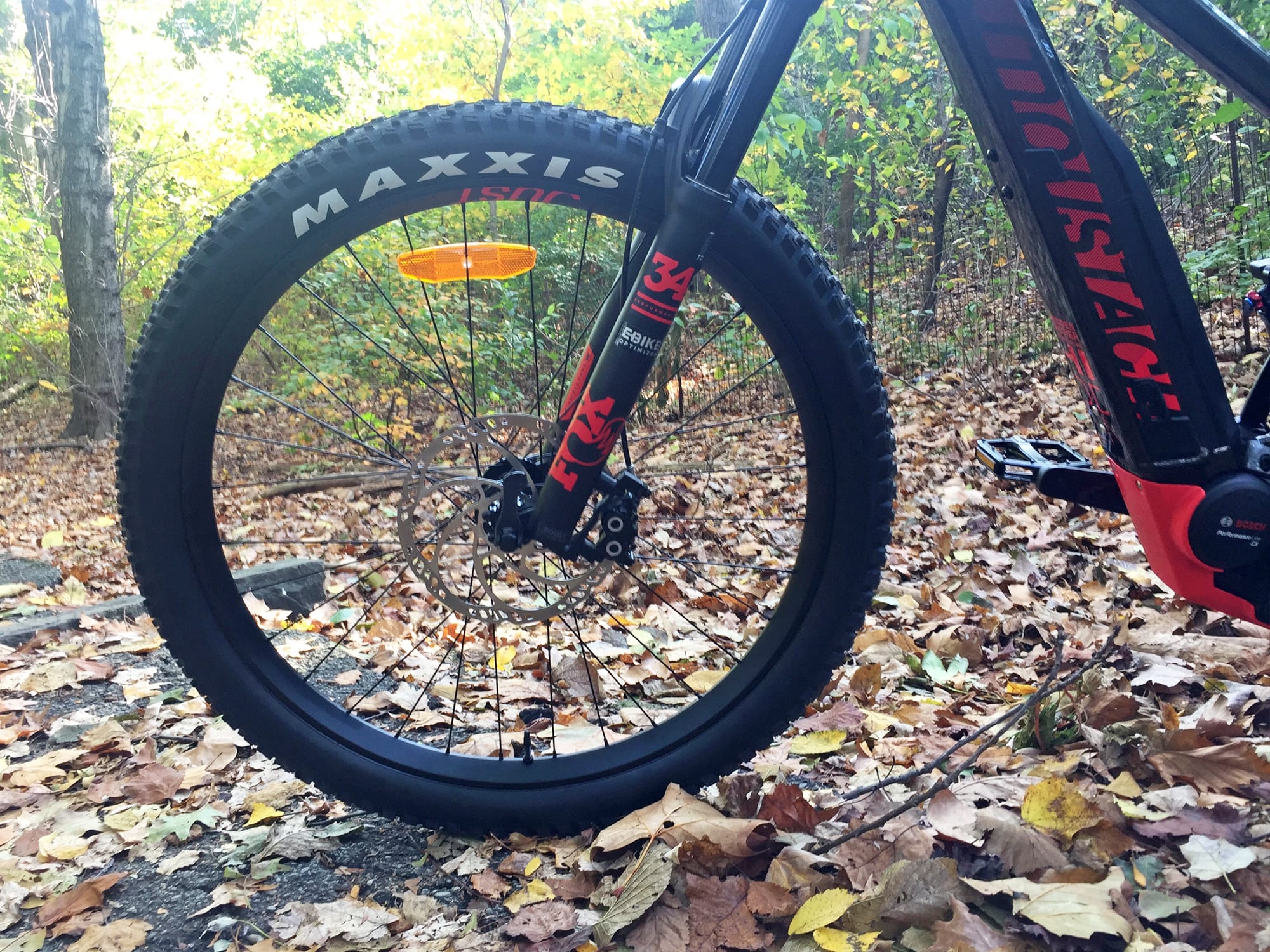
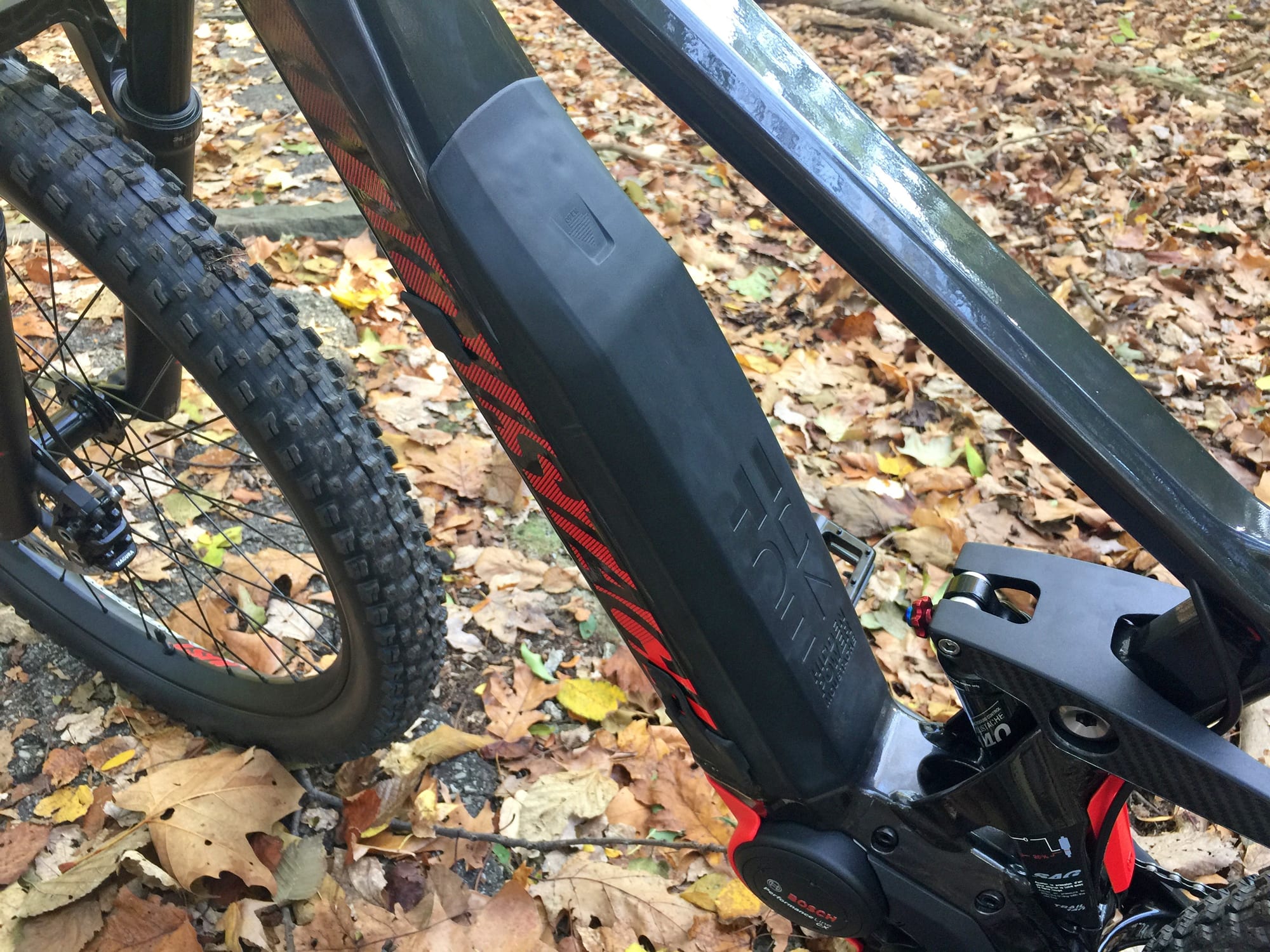
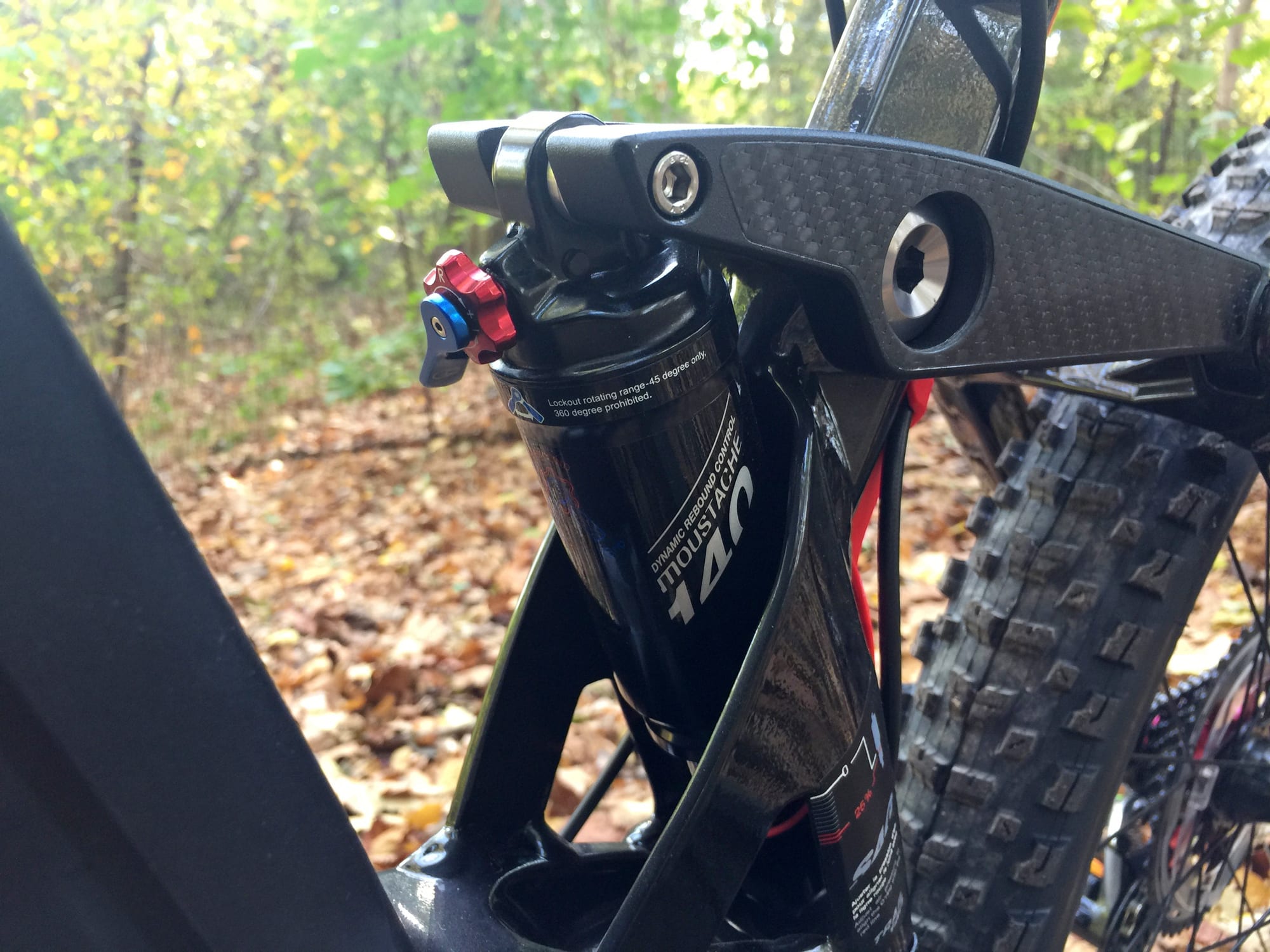
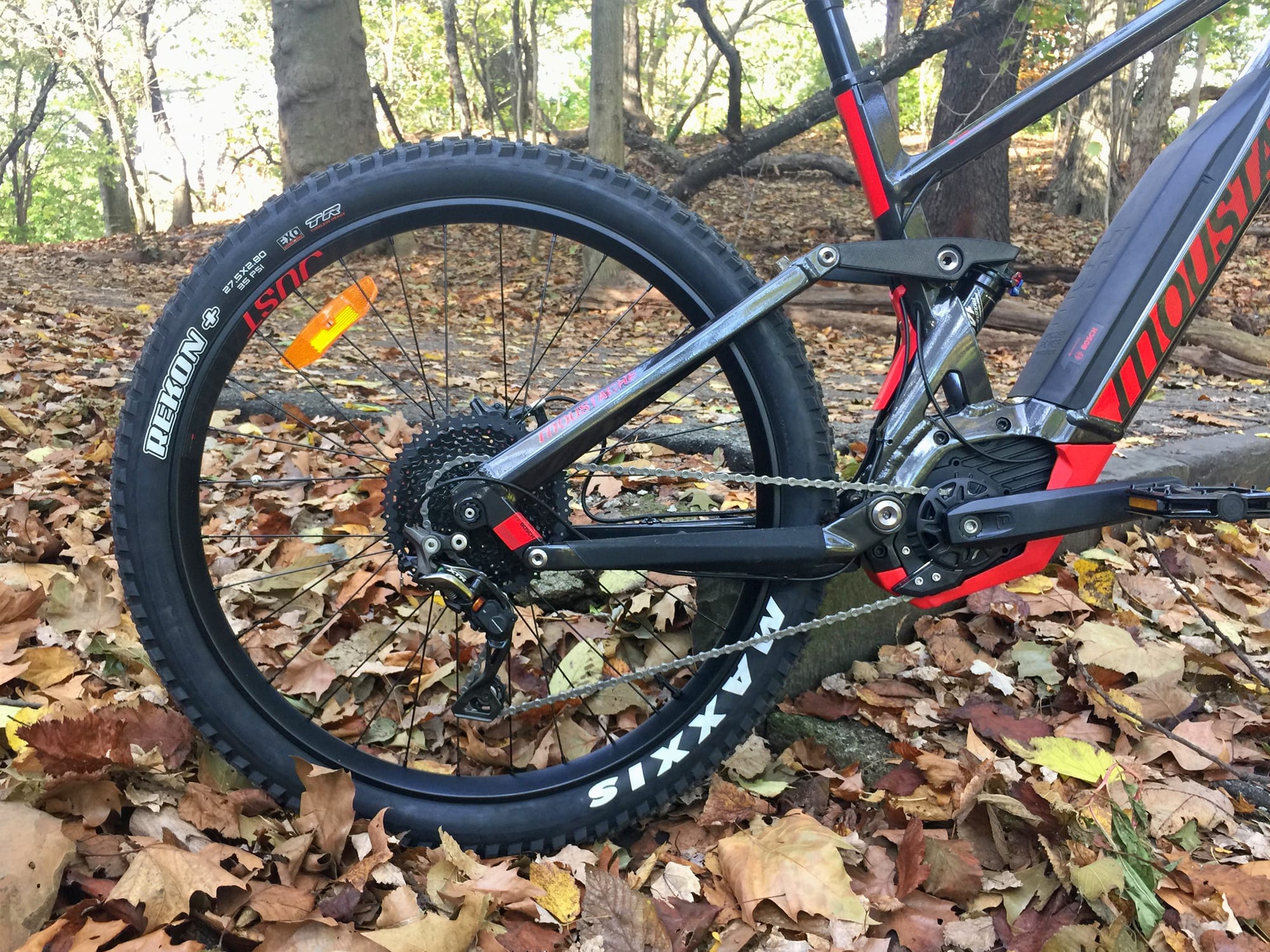
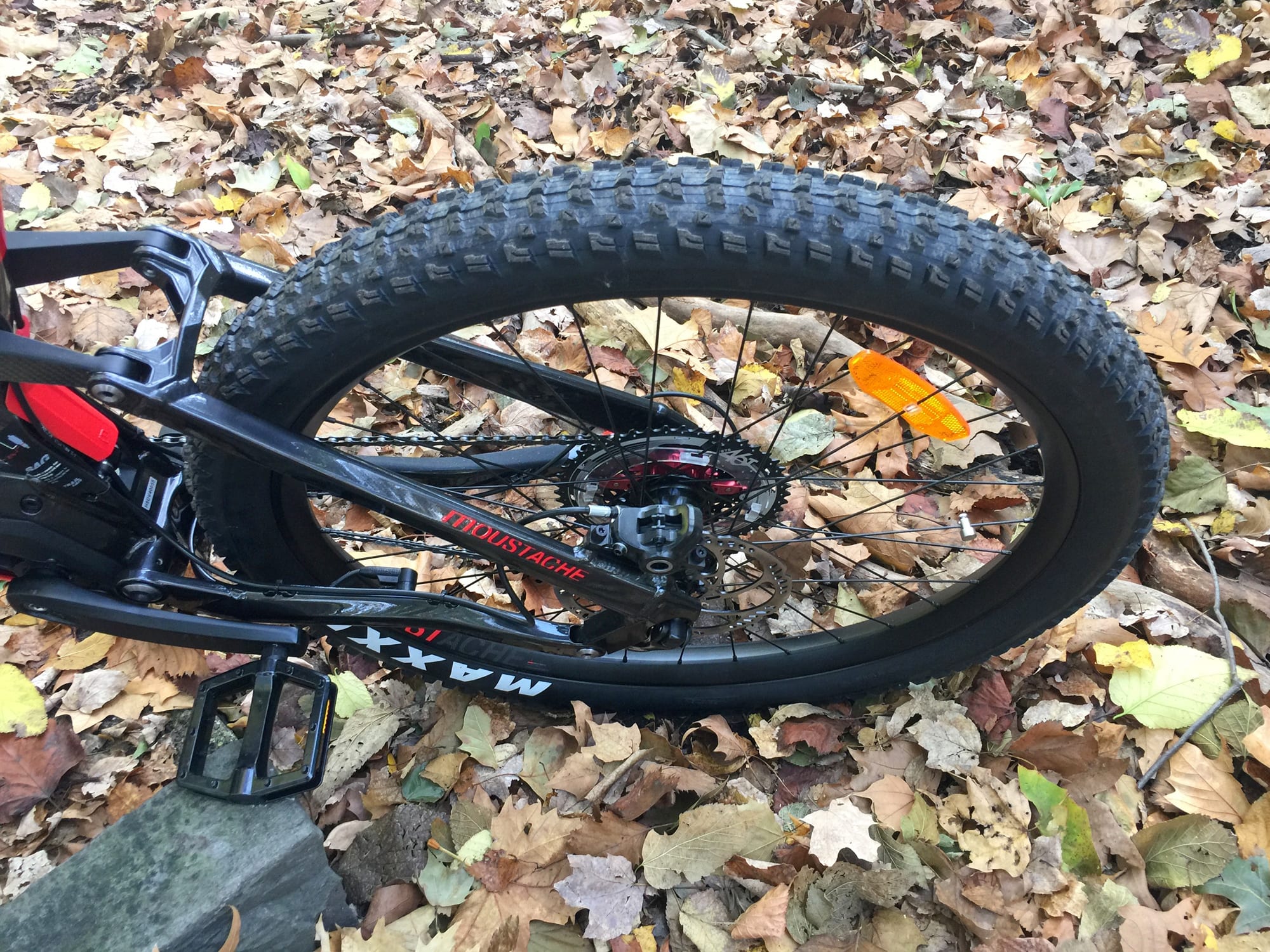
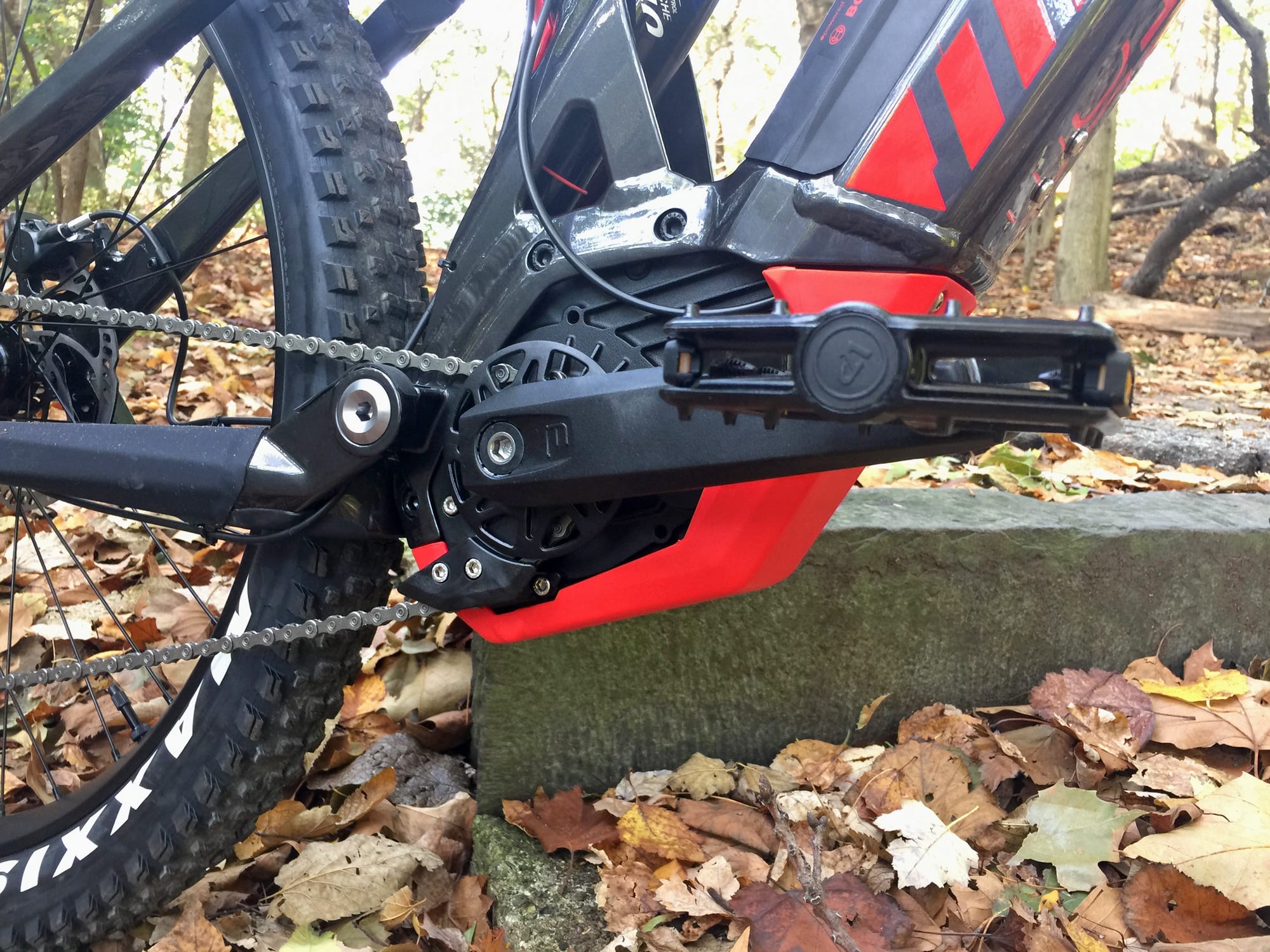
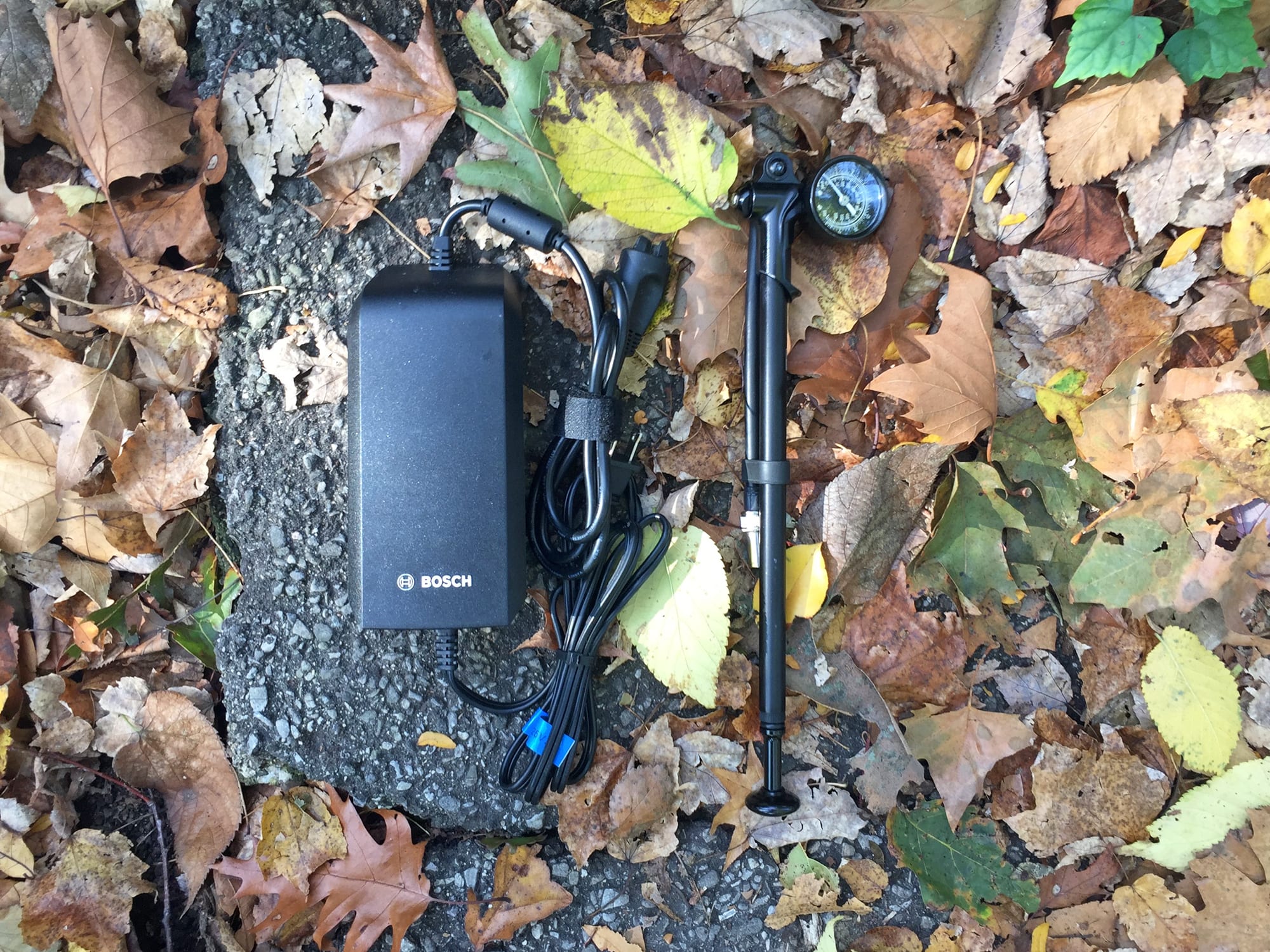



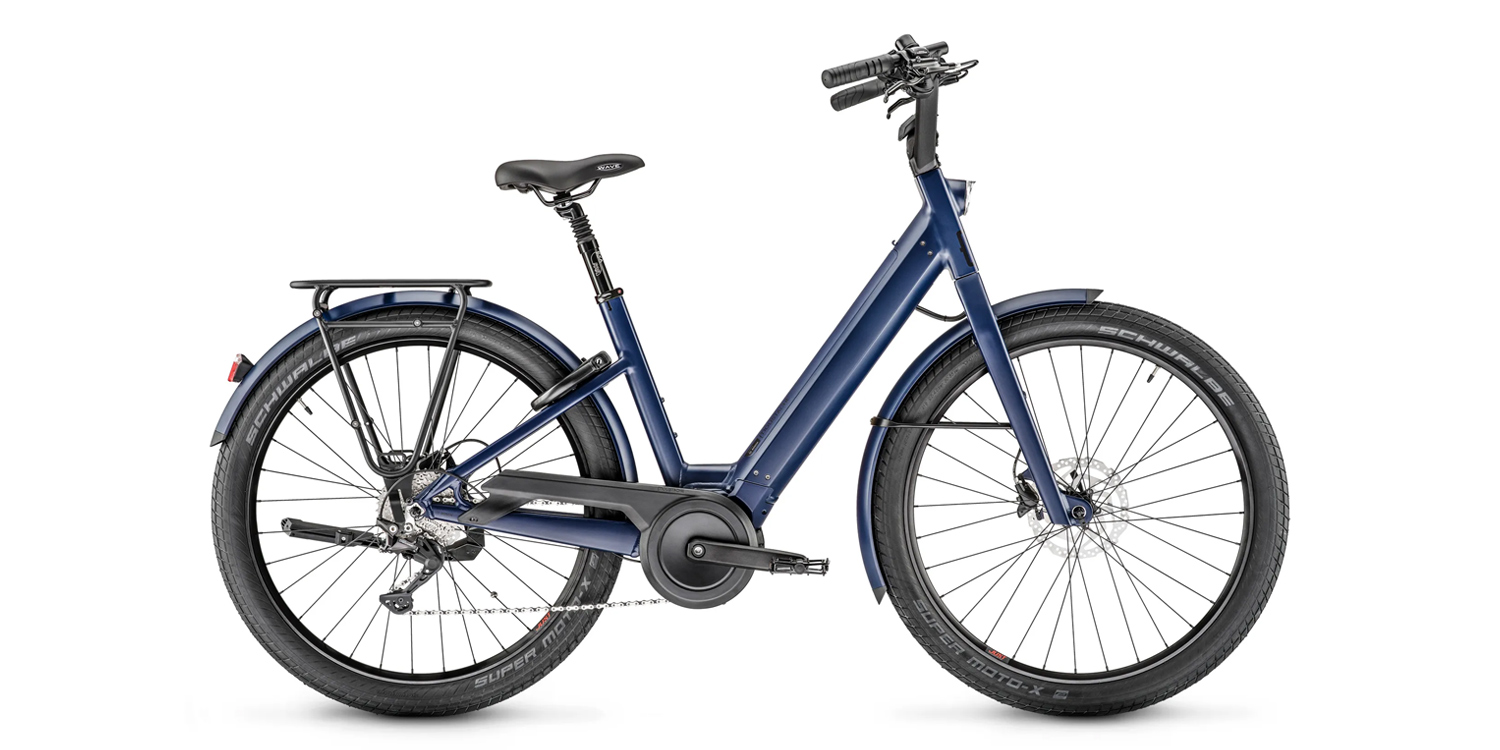

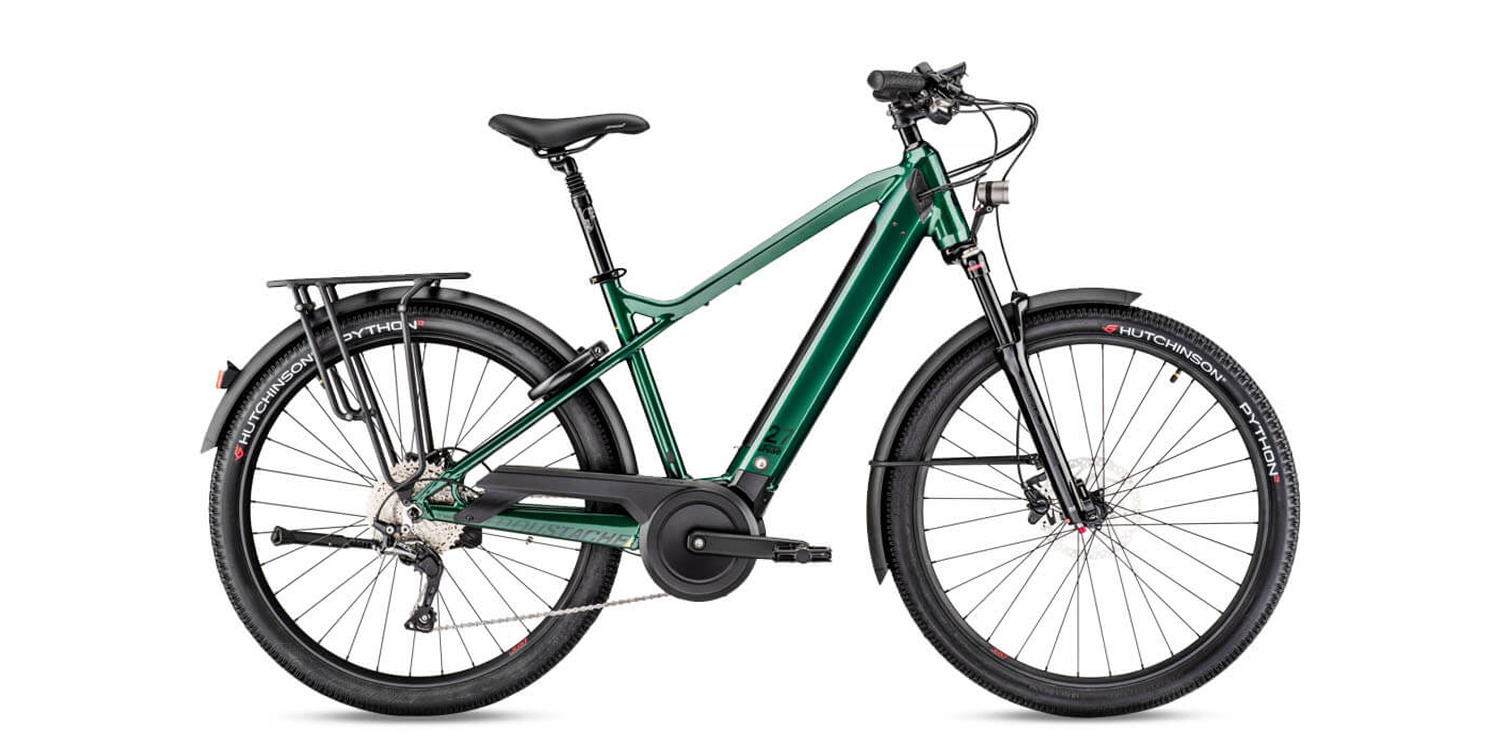
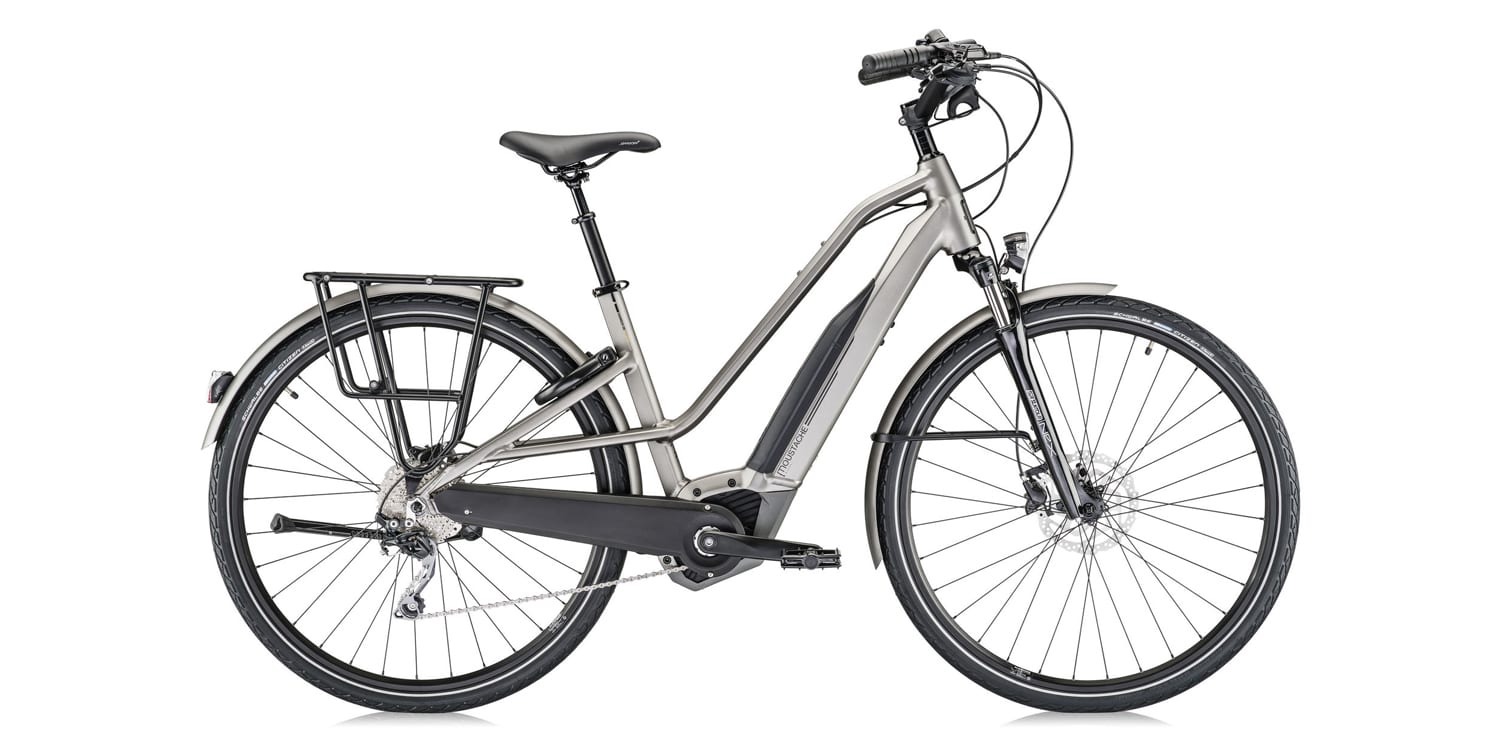
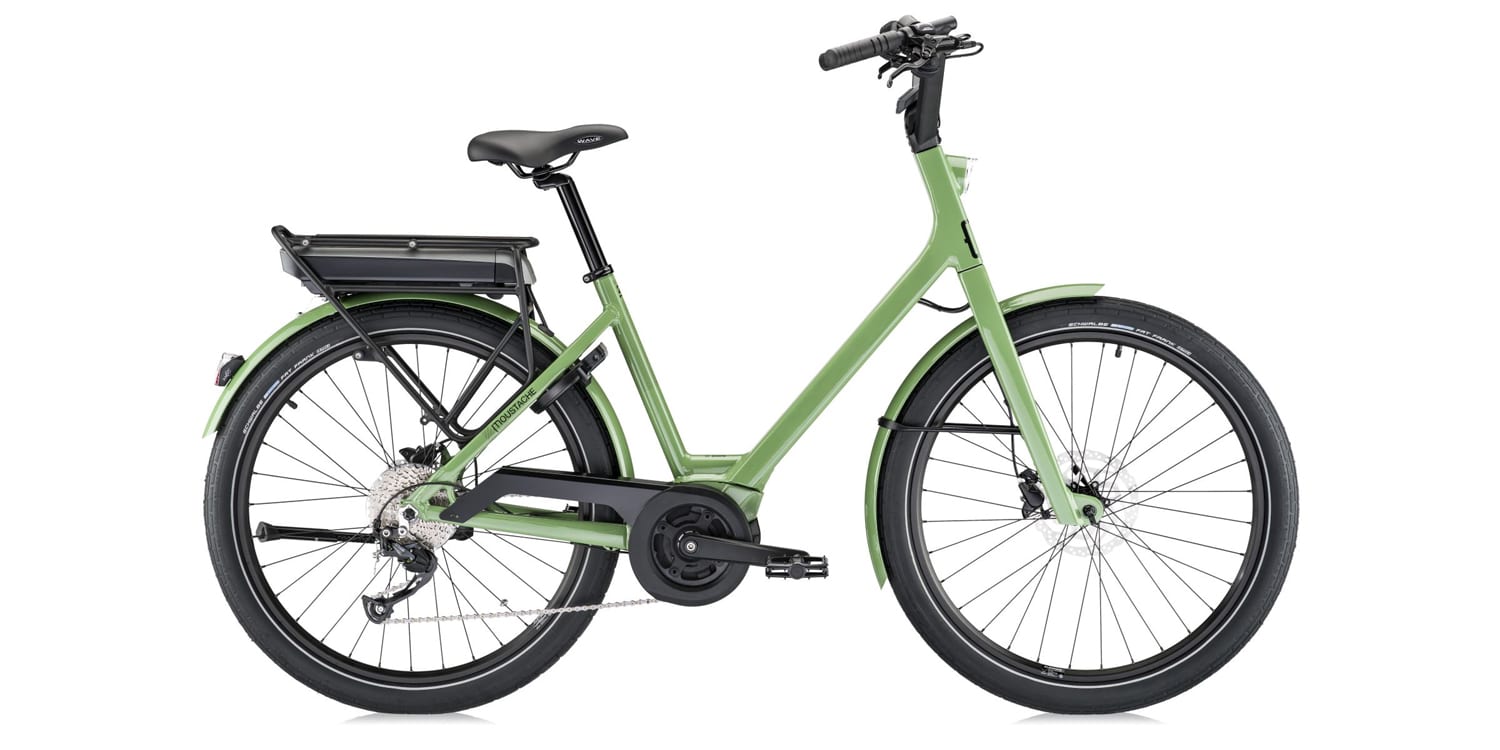
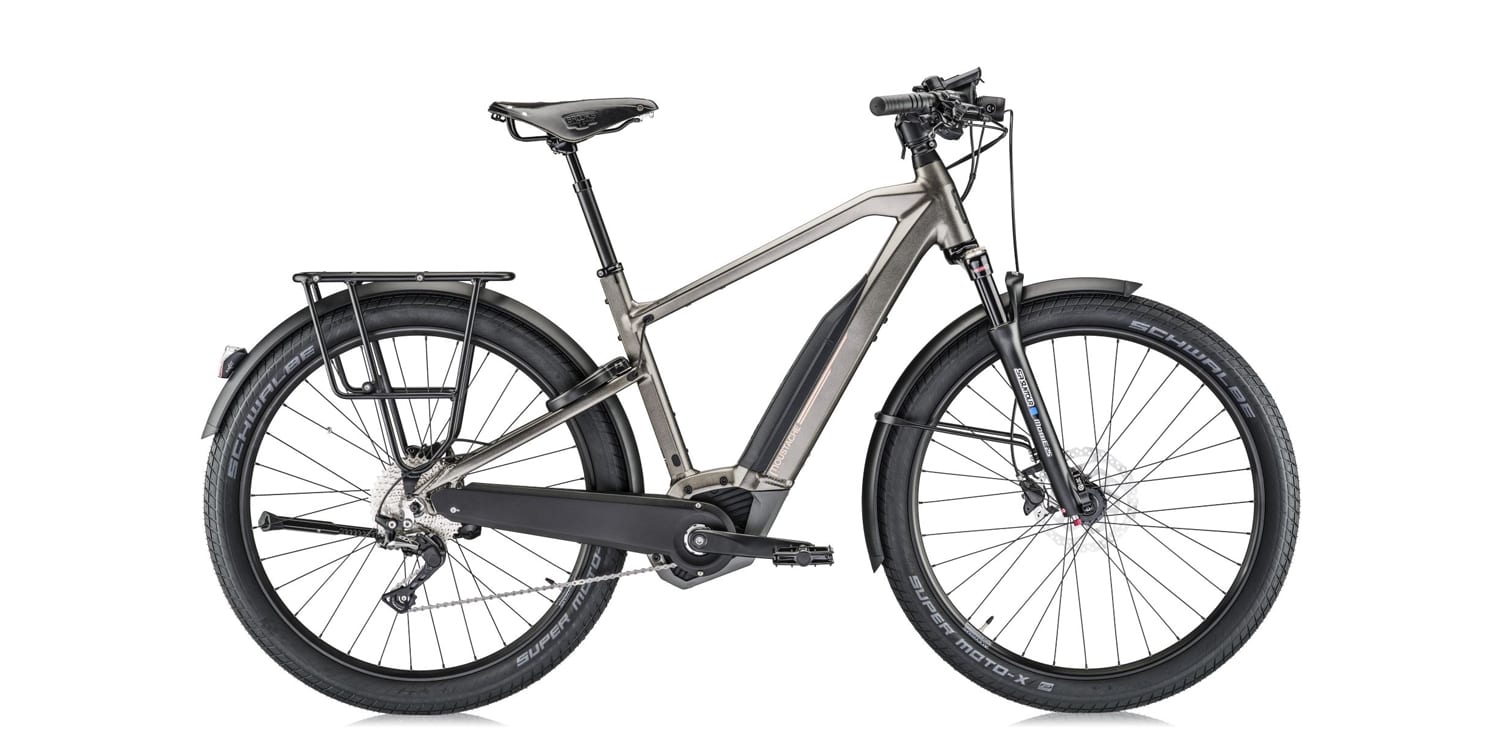
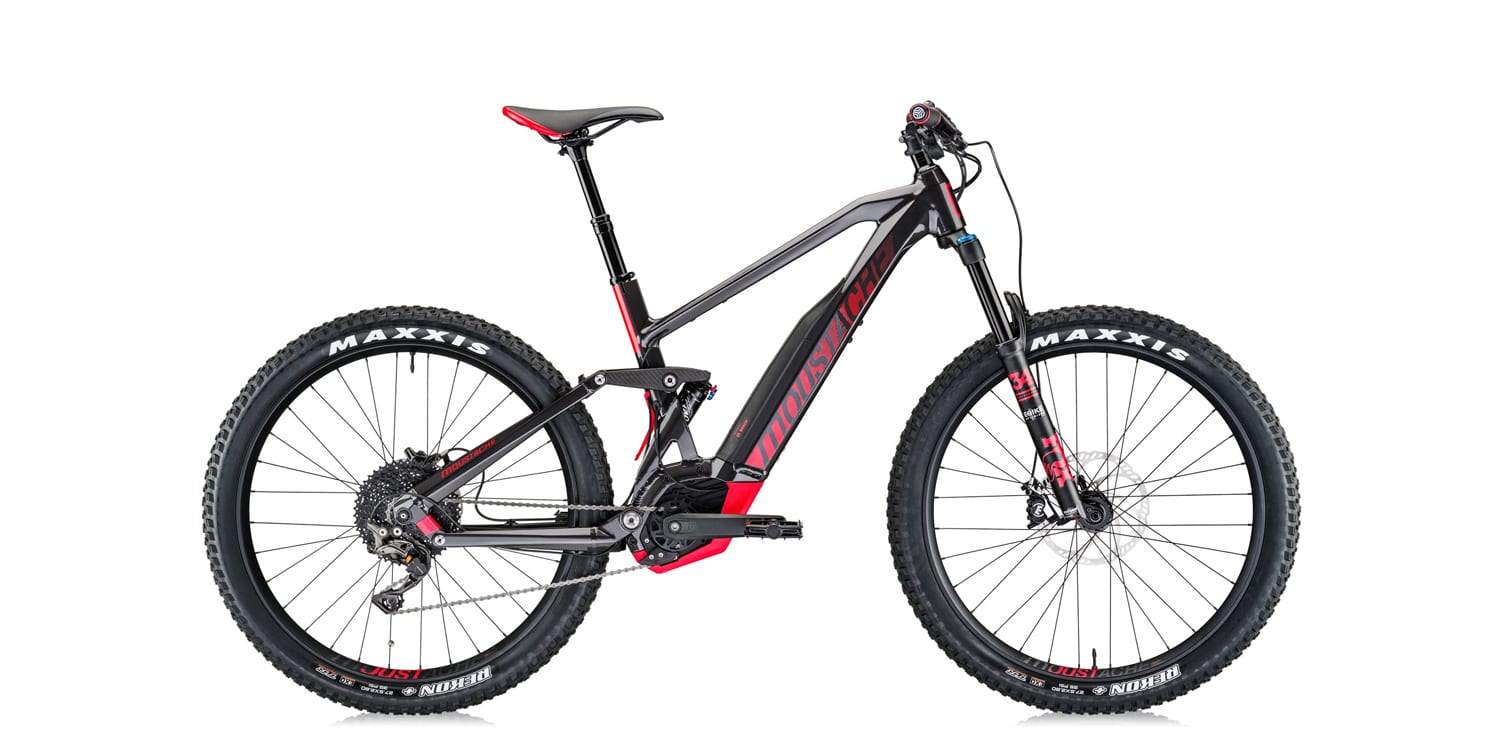

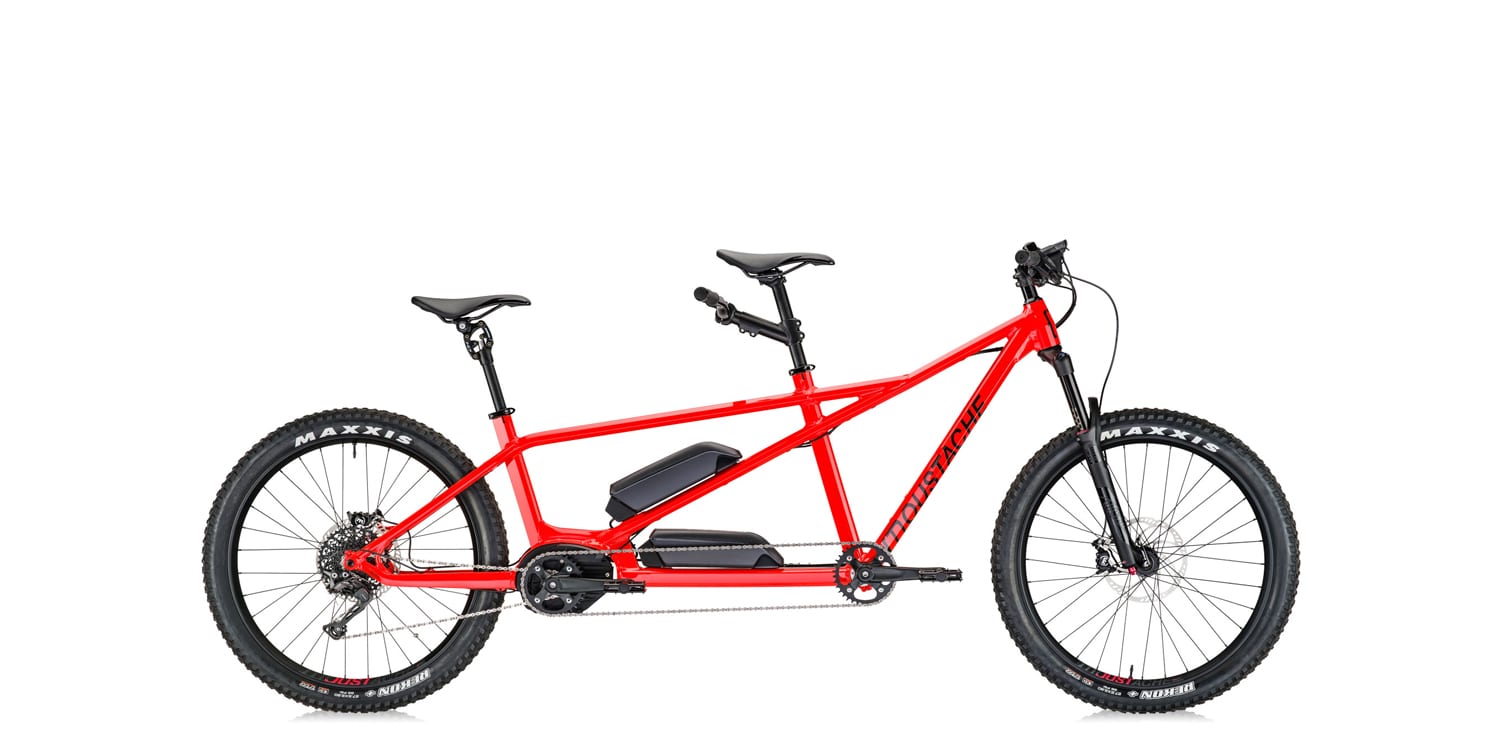
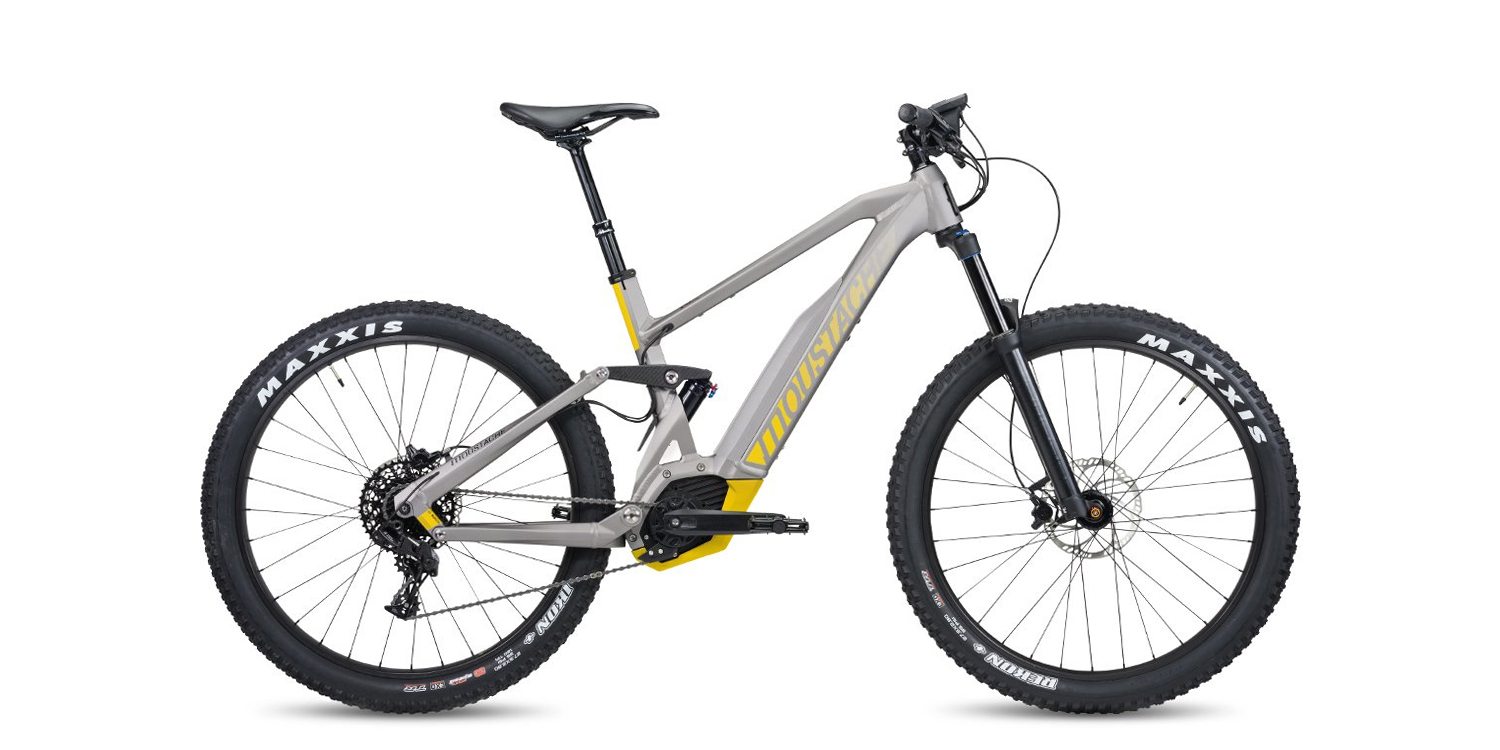

Reader Interactions